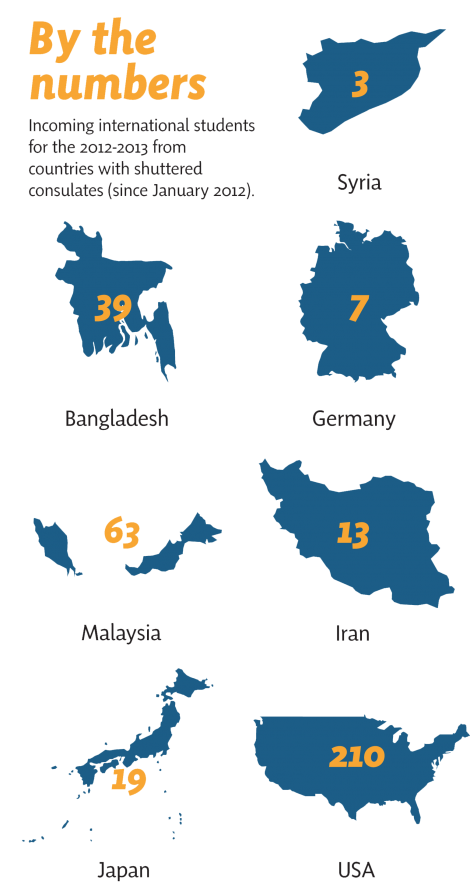Canada has severed diplomatic ties with Iran, the latest instance of an ongoing rollback in the Canadian foreign service that has seen embassies, consulates, and visa-granting offices closed in countries all over the world. The closures could spell trouble for U of T’s growing population of international students.
In a press release last Friday, Foreign Affairs Minister John Baird said the Canadian embassy in Tehran had been permanently closed. The Department of Foreign Affairs and International Trade suggested Canadian-Iranians should instead resort to Turkey for consular and passport services. Baird cited issues like terrorism and jeopardized diplomat safety as reasons for the surprise decision.
Since January 2012, Citizenship and Immigrations Canada has announced several office closures in locations including Tokyo, Berlin, Dhaka, Belgrade, Buffalo, and Kuala Lumpur.
The closures have already impacted students in British Columbia. According to a report in the Ubyssey, more than 80 international students at UBC, 30 to 40 at SFU, and at least 10 at UVic have found themselves in bureaucratic limbo, delaying the start of their scheduled classes until January at the earliest.
“The overall increase in processing times is due to the high volume of applications across the entire visa processing network,” Citizenship and Immigrations spokesperson Danielle Vlemmiks said in an email to the Ubyssey.
According to university spokesperson Michael Kennedy, the University’s Centre for International Experience has not received any requests for assistance from students as a result of the change in Canada’s relationship with Iran. But experts say that the series of closures could pose a problem in the foreseeable future.
“A lot of international students, specifically Canadian-Iranians, who have been direct victims of the closure, are very worried. I think that a lot of them will definitely have problems renewing passports or travelling back home,” said Ramin Jahanbegloo, Iranian-Canadian philosopher and associate professor of political science at U of T.
And for Middle Eastern students at U of T, stories about difficulties obtaining travel documents and visas are all too common. The Varsity spoke to two students, both of whom wished to remain anonymous in light of this controversial issue.
“I missed about 25–30 different flights to Canada because I waited five months for my visa, more than double the time that we had expected. As a result, I took a last-minute 14-hour flight to Toronto and arrived just a day before my classes started. It was, overall, a pretty stressful experience,” said a second-year arts and science student from Pakistan.
One Egyptian student studying international relations said she waited about five years for her Record of Landing papers. This process usually takes six months according to the Citizenship and Immigration Canada website,. She said that it was a stressful situation for her and her family.
According to Jahanbegloo, the difficulties posed by Canada’s cessation of diplomatic contact with Iran affects all Canadians, not only students. Three Canadians — Saeed Malekpour, Ghassemi-Shall, and Hossein Derakhshan — are on death row in a Tehran prison. Jahanbegloo, who was placed in solitary confinement for four months in Tehran, says he knows first-hand that the outlook is pretty bleak.
“I know for a fact that if you don’t have an embassy to support you, your destiny is pretty much left out. I don’t think Canada should have closed these communication channels with Iran because it will make this tragic situation for the imprisoned Canadians worse,” said Jahanbegloo.
A university spokesperson advises international students at U of T experiencing issues with visas to contact the advisors at the Centre for International Experience.


